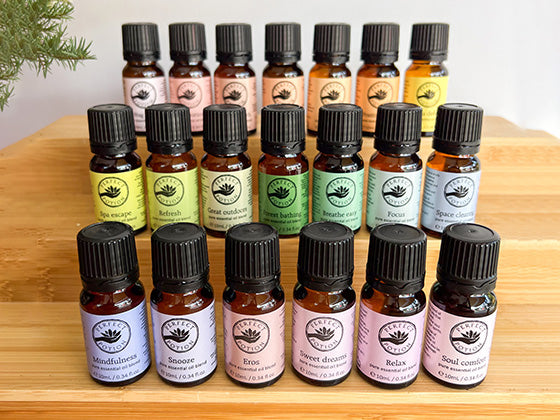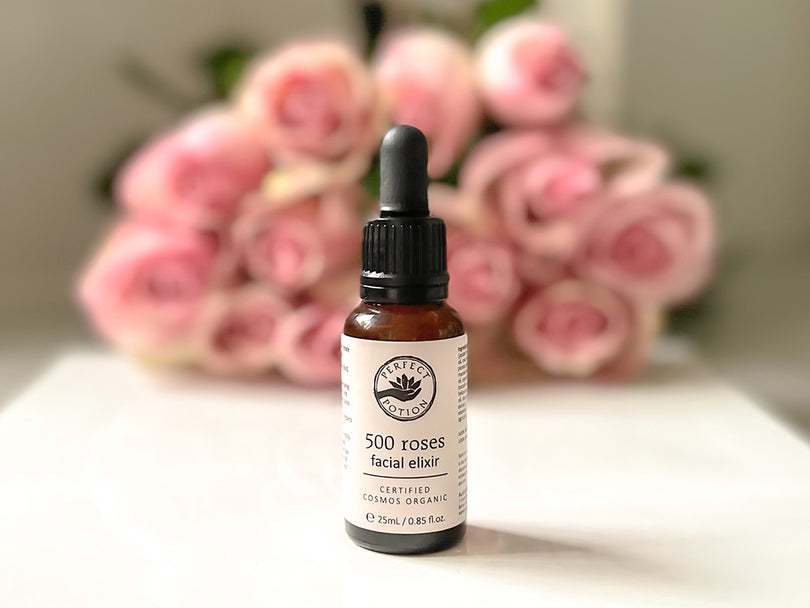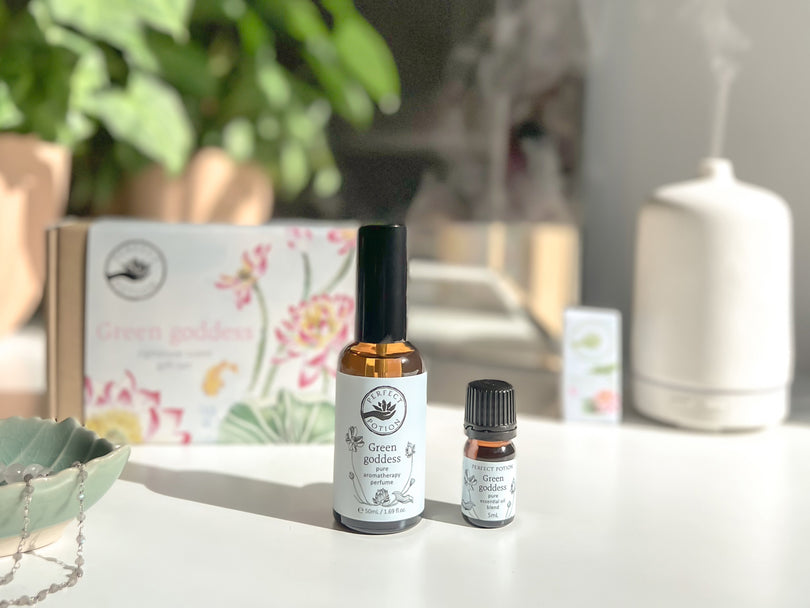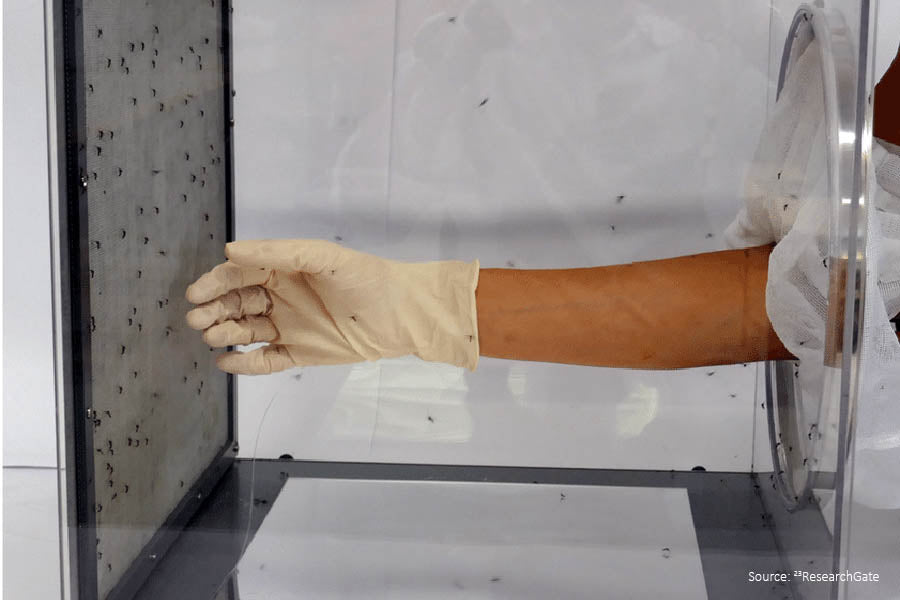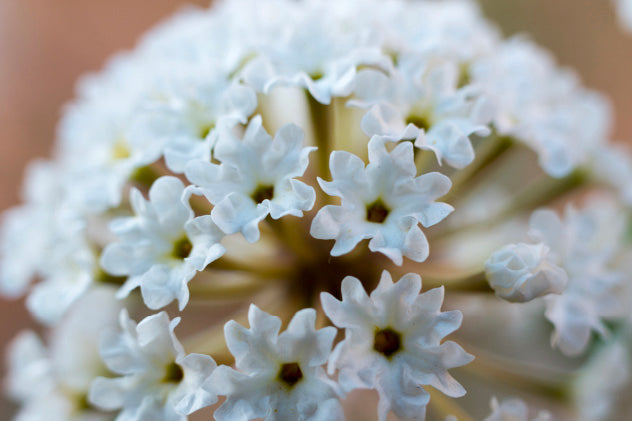Introduction
An insect repellent is generally defined as a substance that discourages insects from landing or biting human skin.1
The mode of action of mosquito repellents is still not fully understood. Researchers have identified that they exert their repellent activity by blocking the olfactory receptors (ORs) and gustatory receptors (GRs) of the insects.2
It is reported that insect repellents interfere with and inhibit the response of the olfactory system of an insect to a normally attractive chemical signal. This suggests that insect repellents interfere with the reception of other chemical signals masking the chemical signature of an otherwise attractive subject.3
Maia et al. suggest many plant volatiles are repellents because they have a high vapor toxicity to insects.4
Essential oils as natural insect repellents
Many essential oils have been reported to have insect repellent activity such as cajeput, citronella, cedarwood, eucalyptus, geranium, lavender, lemongrass, niaouli, palmarosa, patchouli, pennyroyal, peppermint, pine, rosemary, tea tree.
While plant-based repellents are just as effective as synthetic commercial repellents, the drawback is that when tested they tend to provide short-lasting protection, usually less than 2 hours.5
Therefore, essential oils need to be reapplied far more frequently than synthetic based repellents to provide comparable protection.5,6
SHOP OUR NATURAL INSECT REPELLENT
Citronella
Citronella oil is known to have antimicrobial activities; however, it is best known for its insect repellent properties. At concentrations ranging from 5 to 10%, citronella oil-based products are the most popular choices on the market.7
Citronella oil was used by the Indian Army to repel mosquitos at the beginning of the 20th century and was registered for commercial use in the USA in 1948.4
Citronella oil is registered in the USA (EPA Environmental Protection Agency) as an insect repellent due to its high efficacy, low toxicity and customer satisfaction.8,9 The main constituents contributing to the insect repellent properties of citronella oil were reported to be geraniol and citronellol.10
Perfect Potion’s citronella oil (Cymbopogon winterianus) is sourced from Indonesia and the chemical profile is as follows: citronellol 9.81%, geranial 0.86%, citronellal 40.47%, limonene 3.6%, geranyl acetate 3.94%, geraniol 24.04%, linalool 0.64%, citronellyl acetate 2.05%.

Other essential oils
A study in Australia by Grieve et al. confirmed that insect repellents using Melaleuca oils were shown to be effective at repelling mosquitos such as the Aedes vigilax and Verrallina carmenti, as well as the bush fly (Musca vetustissima) and biting midges (Culicoides ornatus). The study reported that the Melaleuca-based repellents were shown to be as effective as a synthetic-based commercial repellent and can deliver repellency on par with synthetic actives.5
The US EPA’s registered plant-derived essential oils approved for application to the skin include citronella oil and lemon eucalyptus.5
The study by Grieve et al involved a laboratory and field trial of a range of Australian essential oils including lemon myrtle, buddha wood, lemon scented tea tree and Melaleuca ericifolia found that lemon scented tea tree and Melaleuca ericifolia provided over 96% protection upon application; however, after 60 minutes the repellency dropped to 50%.5
It was also noted that the Ae. Aegypti mosquito showed a high tolerance to essential oils.5
PMD (para-menthane 3, 8-diol) as an isolated ingredient, found in lemon eucalyptus provides very high protection from a broad range of insects for several hours, whereas the essential oil is repellent for around one hour.4
It has been suggested that in those communities in which commercial insect repellents are prohibitively expensive, citronella-based repellents may provide important protection from mosquitoes.4
Why natural?
Many consumers are reluctant to apply DEET to their skin due to safety concerns, and prefer to use natural based alternatives.5
DEET has been used since 1946 as an insect repellent and the toxicology of DEET has be more closely scrutinized than any other repellent.4
It is regularly promoted that DEET is very effective and provides the most complete and longest protection against mosquitoes and is deemed safe.11
However, cases of respiratory distress and seizures have been reported in children following brief exposure to low-strength DEET. A review found 17 reports of DEET-induced encephalopathy in children.12,13
A Scientific American paper reported a study conducted in the late 1980s on Everglades National Park employees found that 25% of the subjects experienced negative health effects that were blamed on exposure to DEET. These side effects included rashes, skin irritations, numb or burning lips, nausea, headaches, dizziness and difficulty concentrating.14
Duke university pharmacologist Mohamed Abou-Donia, has been researching the effects of pesticides on the brain for over 30 years found that frequent and prolonged DEET exposure in rats caused neurons to die in regions of the brain that control muscle movement, learning, memory and concentration and is concerned that when combined with other chemicals or medications could cause brain deficits in vulnerable populations.15
The Victorian Government and Western Australian advise that DEET repellents should not be sprayed onto the skin of children under the age of one and recommend that you should only choose a product that contains less than 10% DEET and that it be used sparingly.16,17
The American Academy of Pediatrics (AAP) also recommends applying DEET sparingly as needed until children reach age of 2. The AAP also urges parents to be “especially cautious” about using DEET on newborns or premature infants.18
However, the EPA is adamant that DEET is safe and does not present a health concern and simply suggests that the consumer is advised to read and follow label directions when using any pesticide product.19
Why a blend of essential oil is more effective?
While citronella is promoted as the main essential oil have insect repellent activity, many studies have confirmed that blending it with other oils can improve its efficacy.
A study by Sajo et al. stated that the protection time and repellency of citronella oil can be doubled when combining it with other essential oils.20
One study from Thailand found that a combination of citronella oil and vanillin are likely to provide complete repellency for at least 3 hours. The study also indicates that the combination of citronella oil and vanillin demonstrated a comparable protection time to DEET.21
It appears that the vanillin has a fixative like action.1
One study from Indonesia reported that a combination of citronella oil and patchouli can provide protection of 85.2% for up to 6 hours.22
Conclusion
The topical application of citronella oil and citronella oil based natural insect repellents can be used as an easily available, affordable and effective insect repellent. They can provide comparable protection to synthetic based insect repellents as long as they reapplied far more frequently.

SHOP OUR NATURAL INSECT REPELLENT
References
- Lee MY. Essential oils as repellents against arthropods. BioMed Research International. 2018;Article ID 6860271. 9 pages. doi: 10.1155/2018/6860271
- Dickens JC et al. Mini review: mode of action of mosquito repellents. Pesticide Biochemistry and Physiology. 2013. doi: 10.10165/j.pestbp.2013.02.006
- Syed Z et al. Mosquitos smell and avoid the insect repellent DEET. PNAS. 2008;105(36):13598-13603. doi: 10.1073/pnas.0805312105
- Maia M et al. Plant-based insect repellents: a review of their efficacy, development and testing. Malaria Journal. 2011;10(Suppl 1):S11
- Grieve KA et al. Development of Melaleuca oils as effective natural-based personal repellents. Australian Journal of Entomology 2010;49:40-48. doi: 10.1111/j.1440-6055.2009.00736.x
- Webb CE et al. A review of recommendations on the safe and effective use of topical mosquito repellents. Public Health Research & Practice. 2016;26(5):e2651657 doi: 10.17061/phrp2651657
- Mahmud F et al. Biological & insecticidal effect of citronella oil: a short review. Clinical Medicine and Health Research Journal 2022;2(6):261-265.
- Sharma R et al. Therapeutic potential of citronella essential oil: a review. Current Drug Discovery Technologies. 2019;16(4):330-339. doi: 10.2174/1570163815666180718095041
- Citronella (Oil of Citronella) (021901) Fact Sheet. Downloaded on 3 January 2024 from https://www.epa.gov
- Eden WT et al. The mosquito repellent activity of the active component of air freshener gel from java citronella oil. Journal of Parasitology Research. 2020;Article ID 9053741, 5 pages.
- Chen-Hussey V et al. Assessment of methods used to determine the safety of the topical insect repellent N,N-diethyl-m-toluamide (DEET). Parasite & Vectors. 2014;7:173.
- Briassoulis G. et al. Toxic encephalopathy associated with use of DEET insect repellents: a case analysis of its toxicity in children. Human & Experimental Toxicology. 2001;20(1):8-14. doi: 10.1191/096032701676731093
- Lipscomb JW et al. Seizure following brief exposure to the insect repellent N.N-Diethyl-m-toluamide. Annals of Emergency Medicine. 1992;21(3):315-317. doi: 10.1016/SO196-0644(05)80896-0
- Is it true that the DEET used in most mosquito repellents is toxic? Downloaded on 4 Jan 2024 from https://www.scientificamerican.com/article/is-it-true-that-the-deet/
- Duke pharmacologist says animal studies on DEETs brain effects warrant further testing and caution in human use. Downloaded on 4 Jan 2024 from https://corporate.dukehealth.org/news/duke-pharmacologist-says-animal-studies-deets-brain-effects-warrant-further-testing
- Is DEET safe for children? Downloaded on 4 Jan 2024 from https://goodriddance.com.au/is-deet-safe-for-children
- Fight the bite. Downloaded on 4 Jan 2024 from https://www.healthywa.wa.gov.au/Articles/F-I/insect-repellent
- Is DEET bad for you? Downloaded on 4 Jan 2024 from https://health.clevelandclinic.org/is-deet-bad-for-you-and-your-kids
- DEET. Downloaded on 4 Jan 2024 from https://www.epa.gov/insect-repellent/deet
- Sajo MV et al. Applicability of citronella oil (Cymbopogon winteratus) for the prevention of mosquito-borne diseases in the rural area of Tikapur, far-western Nepal. Rural and remote Health. 2015;15:3532.
- Kongkaew C et al. Effectiveness of citronella preparations in preventing mosquito bites: systematic review of controlled laboratory experimental studies. Tropical Medicine and International Health. 2011;16(7):802-810. doi:10.111/j.1365-3156.2011.02781.x
- Halim R et al. The effect of citronella oil as anti-mosquito spray. International Journal of Mosquito research. 2021;8(5):44-47.
- Evaluation of standard field and laboratory methods to compare protection times of the topical repellents PMD and DEET - Scientific Figure on ResearchGate. Available from: https://www.researchgate.net/figure/The-arm-in-cage-AIC-test-for-measuring-the-efficacy-of-topical-mosquito-repellents_fig5_327161943 [accessed 5 Jan, 2024]

